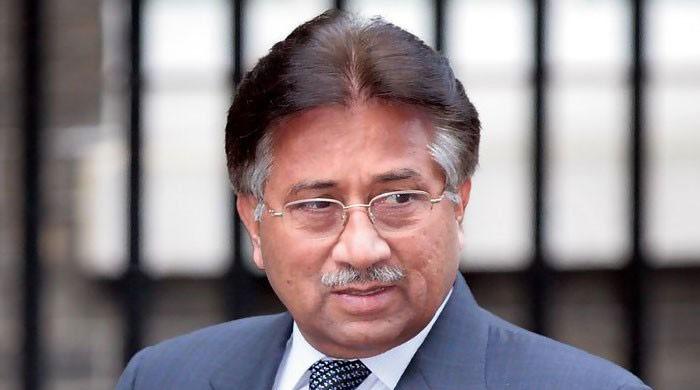High treason case: Musharraf files petition in LHC challenging special court's verdict
 Former president General (retd) Pervez Musharraf. Photo: File
Former president General (retd) Pervez Musharraf. Photo: File
Former president Gen (retd) Pervez Musharraf on Friday filed a petition in the Lahore High Court challenging a special court’s verdict sentencing him to death in a high treason case.
The petition was filed by Azhar Siddique on behalf of Musharraf in the High Court. The special court on December 17 had sentenced the former military ruler to death for imposing a state of emergency on November 3, 2007.
The petition stated that Musharraf was not given a chance to present his arguments and that the “special court quite abruptly and hurriedly wrapped up a trial that was far from its conclusion.”
“The hastily announced judgment is emanating from a prosecution case which suffers, for all intents and purposes from an admitted, noticeable and unexplained delay of over five years from the date of the alleged offence and initiation of proceeding,” the petition stated.
“The then government, by failing to follow the mandated procedure laid down in Section 5 (1) of the Special Courts Act, 1976, lodged the complaint against the applicant in an unlawful manner. Therefore, the complaint against the applicant is void ab initio. The law clearly prescribes that the special court shall only commence proceedings once a complaint of high treason is completely filed by the ‘federal government’.”
Read also: Special court hands death penalty to former military ruler
The petition also challenged paragraph 66 of the special court’s verdict, which read, "We direct the law enforcement agencies to strive their level best to apprehend the fugitive/convict and to ensure that the punishment is inflicted as per law and if found dead, his corpse be dragged to the D-Chowk, Islamabad, Pakistan, and be hanged for three days”.
"The honourable respective president of the special court has crossed all religious moral, civil and constitutional limits, while ruthlessly, irreligiously, unlawfully, unrealistically awarding a debilitating, humiliating, unprecedented and against the dignity of a person sentence,” the petition stated.
“The wordings in paragraph 66 of the impugned judgement, although holding minority view, are still an exercise of languages which directly violates Article 2 of the code of conduct to be observed by the judges,” the petition read.
It added that Justice Nazar Akbar in his dissenting note had mentioned that the actions taken by Musharraf on November 3, 2007 can be termed illegal and unconstitutional but they cannot be tantamount to treason.
“Article 6 of the Constitution had introduced the definition of treason via the 18th Amendment on April 20, 2010, while the crimes in question had occurred in 2007. “One cannot conclude that the emergency of Nov. 3, 2007 was ‘subversion’ or ‘abrogation’ of the Constitution. Neither the Constitution was replaced by any Legal Framework Order nor even the basic structure of the Constitution has been changed.”
Read also: 'Ridiculous, barbaric': Paragraph 66 of Musharraf verdict draws outcry
“The importance of examining the accused in a criminal trial is enormous and any lapse, failure or omission to fulfill this requirement adversely affects the prosecution case”
The special court did not take “into consideration that no actions detrimental to the national interest were taken by the applicant”.
High treason caseThe Pakistan Muslim League-Nawaz (PML-N) government had filed the treason case against Musharraf over the former dictator's imposition of an extra-constitutional emergency in November 2007.
The former army chief was indicted in the case in March 2014 after he appeared before the court. He had rejected all the charges.
On March 18, 2016, the former president had left Pakistan for Dubai for medical treatment after his name was removed from the Exit Control List on the orders of the Supreme Court.
A few months later, the special court had declared him a proclaimed offender and ordered the confiscation of his property owing to his continuous inability to appear.
Later, his passport and identity card were also cancelled on the orders of the apex court.
The head of the prosecution appointed by the PML-N, Mohammad Akram Sheikh, had last year tendered his resignation. In his resignation letter, sent to the interior secretary, Sheikh had expressed his inability to proceed with the case considering the change of government at the centre.


Post a Comment